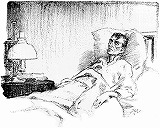MRS. HUDSON, the landlady of Sherlock Holmes, was a long-suffering woman. Not only was her first-floor flat invaded at all hours by throngs of singular and often undesirable characters but her remarkable lodger showed an eccentricity and irregularity in his life which must have sorely tried her patience. His incredible untidiness, his addiction to music at strange hours, his occasional revolver practice within doors, his weird and often malodorous scientific experiments, and the atmosphere of violence and danger which hung around him made him the very worst tenant in London. On the other hand, his payments were princely. I have no doubt that the house might have been purchased at the price which Holmes paid for his rooms during the years that I was with him.
The landlady stood in the deepest awe of him and never dared to interfere with him, however outrageous his proceedings might seem. She was fond of him, too, for he had a remarkable gentleness and courtesy in his dealings with women. He disliked and distrusted the sex, but he was always a chivalrous opponent. Knowing how genuine was her regard for him, I listened earnestly to her story when she came to my rooms in the second year of my married life and told me of the sad condition to which my poor friend was reduced.
“He’s dying, Dr. Watson,” said she. “For three days he has been sinking, and I doubt if he will last the day. He would not let me get a doctor. This morning when I saw his bones sticking out of his face and his great bright eyes looking at me I could stand no more of it. ‘With your leave or without it, Mr. Holmes, I am going for a doctor this very hour,’ said I. ‘Let it be Watson, then,’ said he. I wouldn’t waste an hour in coming to him, sir, or you may not see him alive.”
I was horrified for I had heard nothing of his illness. I need not say that I rushed for my coat and my hat. As we drove back I asked for the details.
“There is little I can tell you, sir. He has been working at a case down at Rotherhithe, in an alley near the river, and he has brought this illness back with him. He took to his bed on Wednesday afternoon and has never moved since. For these three days neither food nor drink has passed his lips.”
“Good God! Why did you not call in a doctor?”
“He wouldn’t have it, sir. You know how masterful he is. I didn’t dare to disobey him. But he’s not long for this world, as you’ll see for yourself the moment that you set eyes on him.”
He was indeed a deplorable spectacle. In the dim light of a foggy November day the sick room was a gloomy spot, but it was that gaunt, wasted face staring at me from the bed which sent a chill to my heart. His eyes had the brightness of fever, there was a hectic flush upon either cheek, and dark crusts clung to his lips; the thin hands upon the coverlet twitched incessantly, his voice was croaking and spasmodic. He lay listlessly as I entered the room, but the sight of me brought a gleam of recognition to his eyes.

“Well, Watson, we seem to have fallen upon evil days,” said he in a feeble voice, but with something of his old carelessness of manner.
“My dear fellow!” I cried, approaching him.
“Stand back! Stand right back!” said he with the sharp imperiousness which I had associated only with moments of crisis. “If you approach me, Watson, I shall order you out of the house.”
“But why?”
“Because it is my desire. Is that not enough?”
Yes, Mrs. Hudson was right. He was more masterful than ever. It was pitiful, however, to see his exhaustion.
“I only wished to help,” I explained.
“Exactly! You will help best by doing what you are told.”
“Certainly, Holmes.”
He relaxed the austerity of his manner.